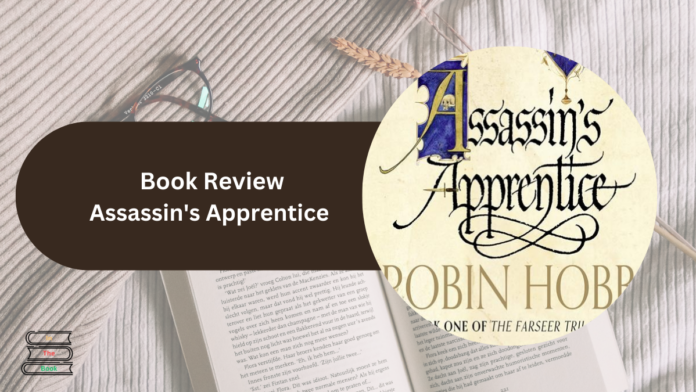Assassin’s Apprentice, the first book in the Farseer Trilogy by Robin Hobb, introduces readers to the rich and immersive world of the Six Duchies.
The novel centers on FitzChivalry Farseer, a royal bastard who is raised in the royal household and trained as an assassin. This review explores the key elements that make Assassin’s Apprentice a compelling read.
Contents
- What is the story?
- What about characters?
- What are the themes?
- What is the theme?
- Conclusion
- FAQs
- What is the main plot of Assassin’s Apprentice?
- Who are the key characters in the book?
- What themes are explored in Assassin’s Apprentice?
- What makes Robin Hobb’s writing style unique?
- Why is Assassin’s Apprentice considered a classic in fantasy literature?
What is the story?
Assassin’s Apprentice begins with the introduction of Fitz, a young boy abandoned by his mother and brought to the keep of his father, Prince Chivalry. As a royal bastard, Fitz’s life is fraught with challenges from the start.
He is raised by the stablemaster Burrich and later taken under the wing of King Shrewd, who sees potential in Fitz as a useful tool for the crown.
Fitz is trained in the arts of assassination and espionage by Chade, the King’s own assassin. Alongside this, Fitz discovers he has the Skill, a form of telepathy, and the Wit, a forbidden ability to communicate with animals.
His journey is one of survival, loyalty, and the struggle for identity in a world that often views him as an outsider.
What about characters?
Fitz is a deeply complex character whose journey from a neglected child to a skilled assassin is both heartbreaking and inspiring.
His internal struggles with his identity and his place in the world add depth to his character, making him relatable and sympathetic.
Fitz’s mentor in the art of assassination, Chade, is a mysterious and wise figure who plays a crucial role in Fitz’s development. His guidance and teachings shape Fitz into a formidable assassin.
The cunning and pragmatic King Shrewd uses Fitz for his own political gains, illustrating the often ruthless nature of the royal court.
Burrich, the stablemaster who raises Fitz with a firm hand and a caring heart, has a relationship with Fitz that is complex and multifaceted, filled with both affection and discipline.
What are the themes?
Fitz’s journey is fundamentally about finding his place in a world that constantly reminds him of his illegitimacy. His struggle with his identity and his search for acceptance is a central theme throughout the novel.
The novel explores the themes of loyalty and sacrifice through Fitz’s unwavering dedication to the Farseer family and his willingness to put himself in danger for the greater good.
The political intrigue and the corrupting influence of power are depicted through the actions of King Shrewd and other members of the court.
What is the theme?
Robin Hobb’s writing is characterized by its rich descriptions and deep emotional resonance. Her ability to create a vivid and immersive world is one of the strengths of the novel.
The intricate details of the Six Duchies, combined with the complex characters, make for an engaging and thought-provoking read.
Assassin’s Apprentice has been widely praised for its character-driven narrative and the depth of its world-building. Readers and critics alike have lauded Hobb’s ability to craft a story that is both epic in scope and deeply personal.
The novel has been recognized as a classic in the fantasy genre, setting the stage for the subsequent books in the Farseer Trilogy.
Conclusion
Assassin’s Apprentice by Robin Hobb is a masterful introduction to the world of the Six Duchies and the life of FitzChivalry Farseer. With its rich character development, intricate plot, and profound themes, the novel is a must-read for fans of fantasy literature.
Hobb’s storytelling prowess ensures that readers are drawn into Fitz’s journey, experiencing his triumphs and tribulations as if they were their own.
FAQs
What is the main plot of Assassin’s Apprentice?
The novel follows FitzChivalry Farseer, a royal bastard trained as an assassin in the royal court, navigating the challenges of his identity and loyalty.
Who are the key characters in the book?
Key characters include FitzChivalry Farseer, his mentor Chade Fallstar, King Shrewd, and Burrich, the stablemaster.
What themes are explored in Assassin’s Apprentice?
Major themes include identity and belonging, loyalty and sacrifice, and the corrupting influence of power.
What makes Robin Hobb’s writing style unique?
Hobb’s writing is known for its rich descriptions, emotional depth, and detailed world-building.
Why is Assassin’s Apprentice considered a classic in fantasy literature?
The novel’s character-driven narrative, intricate plot, and profound themes have earned it acclaim and a lasting place in the fantasy genre.
Read More:
- The Real Reason Invoices Go Unpaid — And How Collection Automation Can Fix It
- Best Places to Buy Diamonds and Engagement Rings Online
- Building Focus and Strategy Through Interactive Digital Experiences
- How Students’ Reading Interests Influence Their Motivation and Performance in Writing Assignments
- The Damages Resulting from the Use of Suboxone

Chandler is an avid automobile enthusiast who is passionate about all things on wheels. From the latest car models to classic vintage rides, I love exploring the automotive world’s intricate details and engineering marvels. With years of experience in test-driving, reviewing, and analyzing cars, I provide readers with comprehensive insights and honest opinions.



























